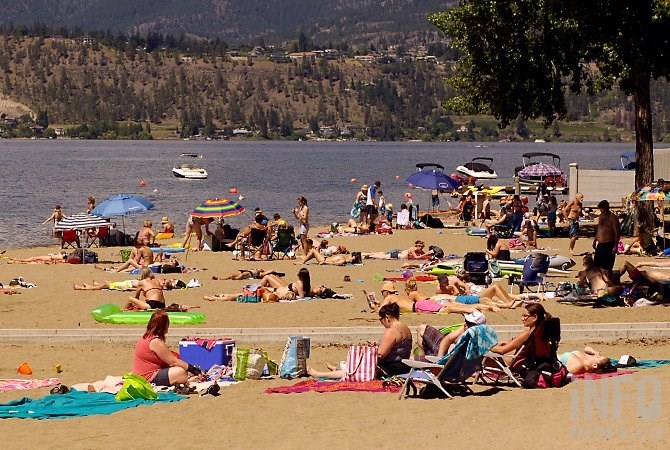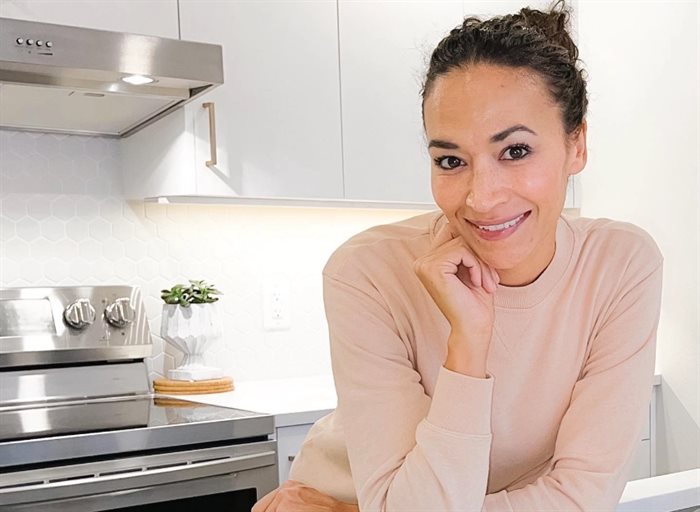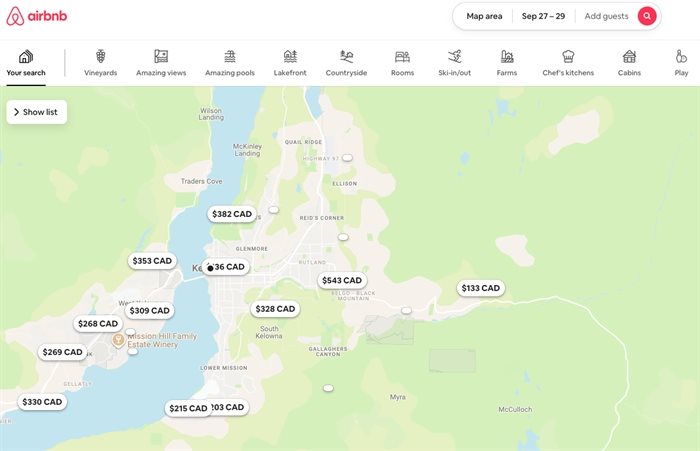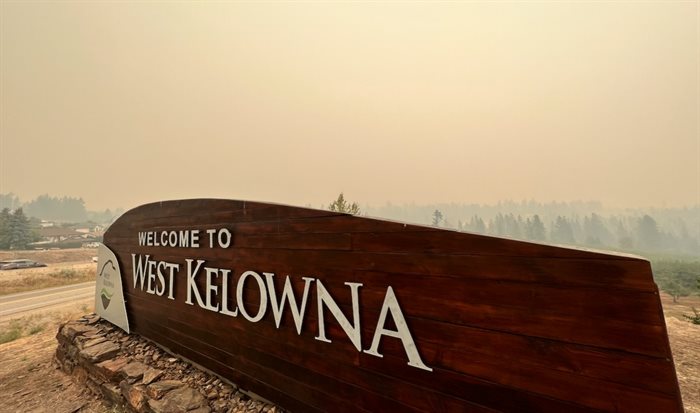'I lost $50K': An Okanagan summer without Airbnb
Lucie says she's never seen so few people during the Okanagan tourist season since she moved here almost a decade ago.
"I have never seen Kelowna so dead in the summer," she said.
Lucie points the finger firmly at the province's decision to scrap short-term rentals.
As the owner of Kelowna House Cleaning Pros, she says she's lost 80% of her clients.
"Airbnbs really affected my income," Lucie says. She declined to give her last name told iNFOnews.ca.
She used to clean between three and 10 short-term rentals a week and demand was high, she says.
However, on May 1, the BC NDP government changed the law and prohibited anyone from letting a home as a short-term rent if it wasn't their primary residence.
The move greatly affected Lucie's business, and she says it had a knock-on effect.
"Everyone is affected. Everyone, not just cleaners... everyone is affected with this thing," she said.
Lucie picked up more clients but isn't happy with the government's move.
Another cleaner, who wasn't authorized to speak on behalf of the company, said all its Airbnb clients disappeared after May 1.
READ MORE: Housing crisis prompts Kelowna to consider tightening restrictions on short-term rentals
Deana Steele owns Keys to Kelowna, a luxury vacation rental management company.
"I had to convert 90% of my portfolio from short-term rentals to our executive rentals... because we no longer qualified," Steele said. "We did a big pivot, so my business wasn't really impacted."
The new provincial rules do have exceptions. West Kelowna opted out and allowed short-term rentals in certain areas and smaller communities of less than 10,000 residents and some tourist destinations are exempt.
Steele said this led to a lot of confusion, especially with overseas guests.
"We basically lost them, and they rebooked at a hotel," she said.
Even Canadians were confused about the rules.
"They thought that there was a total outright ban... so that there would be nothing to choose from, when in fact, we still do have inventory," Steele said.
Her company works with interior designers and makes fancy properties luxurious. She moved into the executive market for stays over 90 days. A unique market with a business model different than a regular short-term rental.
After the rules changed, Steele said two of her clients put their places on the market and one decided to live in it full-time.
But she knows others who bought into the Kelowna condo market for short-term rentals have put them back on the market.
"What they need to cover their financing and costs, (it) is not covered by what long-term rental rates are," she said.
On average, a two-bedroom condo in Kelowna rents for around $2,300 to $2,500 a month. Depending on the season, her clients average about $7,900.
Steele said a nice two-bed and two-bath Kelowna condo on a short-term rental platform could make an owner about $55,000 to $60,000 annually at a 75% occupancy rate, minus management fees.
It's almost double what a landlord makes renting long-term for $2,500 a month.
Steele disputes the idea that getting rid of short-term rentals will help with the housing crisis.
"It doesn't matter if we have inventory. There are people that can't afford to pay $2,800 a month for a two-bedroom condo... $2,300 is still pushing (it)," she said.
Rentals.ca put the average price of rent in Kelowna at $2,552 in August.
And it does appear that landlords with condos at this price point are having difficulty getting tenants.
Kelowna's Ledge on Lakeshore is offering three months of free rent for two-bedroom townhouses that go for between $2,650 and $2,800. Other developments are offering one month free, and some have slashed damage deposits to a quarter of what they could legally charge.
It's worth noting that to keep rent at one-third of your salary, a household needs an income of $100,000 to pay $2,500 in rent.
One of the reasons often touted for bringing in anti-short-term rental laws is that it stops investors from buying up swaths of property and putting it all up as vacation rentals.
However, Steele said it's a misnomer that people who buy condos to use as vacation rentals own multiple units.
"A lot of our investors are from Vancouver, Calgary... Saskatchewan. Their plan is to eventually retire in them," she said.
Her statement fits with Airbnb's narrative that 83% of its clients listing on Airbnb have just one property listed.
READ MORE: Kamloops and Okanagan getting help from province to crack down on short-term rentals
What the province's move appears to have done is put a lot more condos on the market.
According to figures from the Association of Interior Realtors in August 2023, there were roughly 500 condos for sale in the Central Okanagan. That number had jumped 50% by August 2024, with 750 now on the market. While there are a lot more condos on the market, prices have only dropped 4% with the benchmark price in the Central Okanagan sitting at $505,500.
Kelowna property manager Bryan Saul said the new rules have had a huge impact on him.
"I lost about 50 grand just this year alone," Saul said.
He said some of his clients decided to sell but pointed out that with mortgages of $5,000 a month, it's not going to add to much-needed housing.
"Who can afford that?" he said.
"They're missing the boat on the people that they're trying to help out."
Saul said a lot of short-term rentals were also turned into student accommodation for the rest of the year.
"Now all the UBC students have no place to go because this used to be their bread and butter," he said.
The property manager believes about 10% of his now former clients decided to go into the long-term rental market.
It's not yet known if short-term rental landlords continued letting their places after the new rules came in but Saul said only one of his clients considered it and none went ahead with it. Huge fines await anyone wanting to test it.
And it does appear the City of Kelowna and the province, along with Airbnb have got enforcement under wraps.
Kelowna resident Claire, not her real name, said even before the new rules came down she was caught renting her basement without a City of Kelowna licence.
A letter came from the city that contained photos of her Airbnb ad. She doesn't know how they put it all together.
Airbnb spokesperson Nathan Rotman said Airbnb shares all of its data with the City of Kelowna.
"If you weren't operating with a license, you weren't allowed to operate on our platform," Rotman said.
Unsurprisingly, Rotman isn't a fan of the province's new law.
"These one-size-fits-all approaches don't work," he said. "What we're suggesting is where a city passes a law, we will work with that city to support their enforcement and compliance."
Claire said she did comply and moved into the more than 90-day rental market.
"It worked out fine for us," she said. "We ended up getting a few travelling nurses come through, and then we had some students who rented it through the summer."
Financially though it hasn't been as lucrative.
Claire and her husband converted their suite with the plan to let it as a short-term rental. The renovations should have been paid in one year had they been allowed to rent it as a short-term rental. It's going to take a lot longer now.
The couple turned the basement into a legal suite but now, somewhat ironically, it's no longer classed as their main residence – because it's legal – and therefore they are unable to rent it on Airbnb.
Outside of the money, Claire said it's actually worked better with longer-term guests.
"Because there was less turnover and less cleaning," she said. "(And) there's far more security for a landlord than there is with a traditional lease."
Some in the tourism industry have been vocal about having a quiet season and put some of the blame on the lack of accommodation after the new legislation.
Official tourism numbers aren't out yet, but hotel occupancy did increase this summer, mostly.
Kelowna hotel room occupancy was up 4.5% in May and 7% in June. However, it dropped in July by 1.5% and jumped up again in August to 5%.
The number of short-term rentals in the city has dramatically declined. The City of Kelowna confirmed prior to May 1 it had issued approximately 1,200 short-term rental business licences. It now has 431 on its books.
Drawing a direct correlation that the lack of tourist traffic in Kelowna was due to the lack of short-term rentals is difficult, as Steele points out things weren't good in the licenced short-term rental market either.
"Some of our properties occupancy (was) 46% in West Kelowna," she said. "That's more people just not having the money than anything to do with the accommodation side of things."
Like many others who live in the Okanagan, she pointed out August has become known for being smokey due to wildfires, which often keeps the tourists away.
So have the province's new rules helped with the housing crisis?
According to the Airbnb spokesperson they haven't.
Rotman said Vancouver, Toronto and New York have all had tough restrictions on short-term rentals.
"Every month that followed, we saw rents increase and vacancy rates remain the same," he said. “We have a housing crisis in Canada. That crisis needs to be solved by building more housing, not by dealing at the margins with a couple of individuals who are sharing space in their homes or have one or two short-term rentals that they're renting on a vocational basis," he said.
However, for "competitive" reasons Airbnb won't share its numbers on how many short-term rentals it had before the legislation and how many it has now. No up-to-date vacancy rate currently exists.
However, a recently released study produced by researchers based at McGill University found that restrictions made a difference.
The study led by Canada Research Chair in Urban Governance at McGill University, David Wachsmuth, found that places that cracked down on short-term rentals saw rent reductions by 5.7%.
In Vancouver, renters were paying $147 less each month than they would have without the city's rules, the study found.
The study mirrors data from a recent report from rentals.ca, which says average rent across British Columbia has declined by 5.2% in the last year.
How the new rules will affect cities in the Okanagan long term isn't yet known. But anyone who has a quick browse on a short-term rental website will still see plenty of legal and licenced basements and suites up for grabs for a short-stay vacation, instead of the traditional mode which would have likely seen them all rented to long-term tenants.
To contact a reporter for this story, email Ben Bulmer or call (250) 309-5230 or email the editor. You can also submit photos, videos or news tips to the newsroom and be entered to win a monthly prize draw.
We welcome your comments and opinions on our stories but play nice. We won't censor or delete comments unless they contain off-topic statements or links, unnecessary vulgarity, false facts, spam or obviously fake profiles. If you have any concerns about what you see in comments, email the editor in the link above. SUBSCRIBE to our awesome newsletter here.







